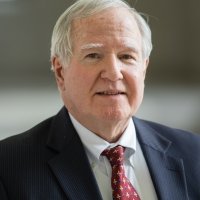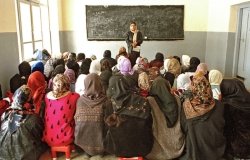Targeting Top Teachers For Superior STEM Education
With the impending reauthorization of the Elementary and Secondary Education Act, the issue of teacher quality is one of particular interest for the upcoming session. The panel of Albert Einstein Distinguished Educator Fellows discussed the characteristics and considerations that a definition for Highly Effective STEM Teachers should address. The Fellows also addressed the impact of high quality professional development programs by outlining their experiences and observations.
Overview
Teacher effectiveness is critical to the future of the U.S. educational system. At the Wilson Center on the Hill event cosponsored by the Program on America and the Global Economy a panel of Albert Einstein Distinguished Educator Fellows discussed teacher quality, professional development, and the definition and evaluation of the term “highly effective”. Kent Hughes, Director of the Program on America and the Global Economy at the Woodrow Wilson Center, began with a brief introduction of the panelists and moderated the discussion.
Kevin Simmons, a High School Physics, Chemistry, and Aerospace Science teacher in Florida noted that highly effective teacher will inspire students to excel by creating real world experiences, connected to the world outside their classroom, and have the flexibility and the freedom to inspire students based on his/her own unique talents. He also spoke about the value of the teacher building a personal relationship with each student in order to inspire them.
Geraldine Robbins, a High School Mathematics teacher in Florida, singled out some trait of highly effective teachers. Robbins cited having world and life experiences and being over-the-top ambitious as being very important. She believes that education is important to America’s future and national security. She also stressed that “education reform cannot come from the top down…educators must rise and lead without being stifled by the atmosphere of compliance that pervades our schools today.” Emphasizing the need for a new model of education, Robbins suggested holding town hall meetings and consulting teachers about the definition of highly effective teachers. Later in the event, she also suggested that the current definition of highly qualified teachers, which ties certification to effectiveness, should be reconsidered.
Matthew Inman, a High School Physics and General Science teacher in Washington, emphasized the importance of not losing sight of the bigger picture of inspiring student sand helping them feel safe in the classroom. Furthermore, he noted the need to review the current process of teacher preparation in the United States. Inman asserted the need for a complex system and a broad vision, stating that “focusing on highly effective teachers is important…but it’s not going to happen in this bubble…if we don’t also have systems in this country that take care of our kids and their families with regard to their health, with regard to the different community services that they need.”
Discussing what she considers to be traits of highly effective teachers, Buffy Cushman-Patz, a Middle School Mathematics and High School Science teacher in Hawaii, noted the significance of having rich and deep content knowledge as well as being a lifelong learner who is self-reflective and empathetic. She asserted the need for high-quality, ongoing professional development for teachers, led by other teachers. She also expressed her support of the transition from focusing on teachers’ qualifications to focusing on their effectiveness.
When asked about how an outside observer can measure highly effective teachers, Cushman-Patz stressed longevity of understanding and retention of material as important indicators for measuring teacher effectiveness. Inman noted the need for assessment and measurement environments for teachers that are supportive, rather than punitive. Robbins also added that we need to be careful where we place newer teachers because often times they end up in the tougher classrooms and schools. The panel then discussed the important role that parents play in the educational process and the responsibility that they have for their children’s education.
When asked about professional development and tapping into STEM teachers’ abilities to excite and inspire, Simmons mentioned the need for some flexibility within the curriculum so that each teacher can use his/her unique set of skills and life experiences and inspire others through the content that they are intrinsically passionate about. The panel was then asked about changing the perception of the American public to see themselves as part of the solution, as well as about creating more flexible legislation. According to Inman, “we need to make use of every person who has the potential to be a great teacher and we should not keep these people out of the profession due to silly hoop-jumping processes.” He stressed the need for creative solutions to bringing teachers into the field and offered the reminder that “this is a societal issue and something that we all need to be tackling from inside the educational system and out.” Furthermore, Cushman-Patz quoted a recent report by the National Research Council that stated “Research suggests that although teacher qualifications matter, the school context—its culture and conditions—matters just as much, if not more.” She also emphasized the role that school leadership can play in empowering teachers.
By: Erica Pincus
Kent Hughes, Director, Program on America and the Global Economy
Speakers
Buffy Cushman-Patz
Matthew Inman
Geraldine Robbins
Kevin Simmons

Kent Hughes
Former Director, Program on America and the Global Economy, Woodrow Wilson Center
Thank you for your interest in this event. Please send any feedback or questions to our Events staff.










